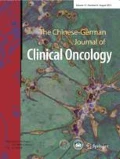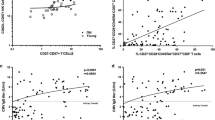Abstract
Objective
To investigate the effects of soluble factors secreted by acute myeloid leukemia (AML) cells on the phenotypical and functional properties of DCs derived from normal mononuclear cells.
Methods
Mononuclear cells were cultured with interleukin-4 (IL-4) and granulocyte-macrophage colony-stimulating factor (GM-CSF), in the presence or absence of 24 h culture supernatants from fresh primary AML cells, to generate immature DCs. The maturation of DCs was induced by cytokines IL-1beta, IL-6, tumor necrosis factor-alpha (TNF-alpha), and prostaglandin-2 (PGE-2). The phenotypic alterations of DCs and DCs-primed CD4+ T cells were evaluated using flow cytometry. Precursor frequency (PF) was calculated to monitor the allostimulatory effects of DCs on CD4+ and CD8+ T cells.
Results
AML cell supernatant-treated DCs showed significantly lower expression of co-stimulatory molecules CD80 and CD86, and reduced response to cytokines IL-1beta, IL-6, TNF-alpha, and PGE-2. The allostimulatory effects of AML cell supernatant-treated DCs on CD4+ and CD8+ T cells were significantly lower than those of normal mature DCs [PF: (1.8 ± 0.5)% vs. (5.2 ± 1.6)% for CD4+ T cells, (2.1 ± 0.6)% vs. (6.5 ± 2.0)% for CD8+ T cells, P < 0.01]. These AML supernatant-induced DCs could also induce allogeneic CD4+ T cells to differentiate into CD4+CD25high T cells, which had immunophenotyping characteristics of regulatory T cells, i.e. they expressed Foxp3 but not active maker CD69.
Conclusion
This study demonstrates that soluble factors secreted by AML cells can inhibit development and functions of DCs. In addition, AML supernatant-induced DCs can induce the generation of CD4+CD25high T cells from CD4+ T cells, which may be a mechanism of increased prevalence of CD4+CD25high regulatory T cells and immune dysfunction in AML patients.
Similar content being viewed by others
Abbreviations
- T-reg:
-
regulatory T cells
- PBMC:
-
peripheral blood mononuclear cell
- AML:
-
acute myeloid leukemia
- DC:
-
dendritic cells
- Ctrl-iDC:
-
control immature dendritic cell
- AML-iDC:
-
AML culture supernatant-exposed immature dendritic cell
- AML-mDC:
-
AML culture supernatant-exposed mature dendritic cell
- Ctrl-mDC:
-
control mature dendritic cell
References
Wang X, Zheng J, Liu J, et al. Increased population of CD4(+)CD25(high), regulatory T cells with their higher apoptotic and proliferating status in peripheral blood of acute myeloid leukemia patients. Eur J Haematol, 2005, 75: 468–476.
Kiertscher SM, Luo J, Dubinett SM, et al. Tumors promote altered maturation and early apoptosis of monocyte-derived dendritic cells. J Immunol, 2000, 164: 1269–1276.
Almand B, Resser JR, Lindman B, et al. Clinical significance of defective dendritic cell differentiation in cancer. Clin Cancer Res, 2000, 6: 1755–1766.
Kacani L, Wurm M, Schennach H, et al. Immunosuppressive effects of soluble factors secreted by head and neck squamous cell carcinoma on dendritic cells and T lymphocytes. Oral Oncol, 2003, 39: 672–679.
Bellone G, Carbone A, Smirne C, et al. Cooperative induction of a tolerogenic dendritic cell phenotype by cytokines secreted by pancreatic carcinoma cells. J Immunol, 2006, 177: 3448–3460.
Perrot I, Blanchard D, Freymond N, et al. Dendritic cells infiltrating human non-small cell lung cancer are blocked at immature stage. J Immunol, 2007, 178: 2763–2769.
Mahnke K, Qian Y, Knop J, et al. Induction of CD4+/CD25+ regulatory T cells by targeting of antigens to immature dendritic cells. Blood, 2003, 101: 4862–4869.
Mohty M, Jarrossay D, Lafage-Pochitaloff M, et al. Circulating blood dendritic cells from myeloid leukemia patients display quantitative and cytogenetic abnormalities as well as functional impairment. Blood, 2001, 98: 3750–3756.
Menetrier-Caux C, Montmain G, Dieu MC, et al. Inhibition of the differentiation of dendritic cells from CD34(+) progenitors by tumor cells: role of interleukin-6 and macrophage colony-stimulating factor. Blood, 1998, 92: 4778–4791.
Um SH, Mulhall C, Alisa A, et al. Alpha-fetoprotein impairs APC function and induces their apoptosis. J Immunol, 2004, 173: 1772–1778.
Péguet-Navarro J, Sportouch M, Popa I, et al. Gangliosides from human melanoma tumors impair dendritic cell differentiation from monocytes and induce their apoptosis. J Immunol, 2003, 170: 3488–3494.
Sombroek CC, Stam AG, Masterson AJ, et al. Prostanoids play a major role in the primary tumor-induced inhibition of dendritic cell differentiation. J Immunol, 2002, 168: 4333–4343.
Yamazaki S, Inaba K, Tarbell KV, et al. Dendritic cells expand antigenspecific Foxp3+CD25+CD4+ regulatory T cells including suppressors of alloreactivity. Immunol Rev, 2006, 212: 314–329.
Ghiringhelli F, Puig PE, Roux S, et al. Tumor cells convert immature myeloid dendritic cells into TGF-beta-secreting cells inducing CD4+CD25+ regulatory T cell proliferation. J Exp Med, 2005, 202: 919–929.
Li L, Li SP, Min J, et al. Hepatoma cells inhibit the differentiation and maturation of dendritic cells and increase the production of regulatory T cells. Immunol Lett, 2007, 114: 38–45.
Author information
Authors and Affiliations
Corresponding authors
Additional information
Supported by grants from the National Outstanding Young Investigator Program (30225038), Anhui Provincial Natural Science Foundation (070413094), Scientific Research Fund of Anhui Provincial Education Department (2006KJ072C) and Science and Technological Fund of Anhui Province for Outstanding Youth.
Rights and permissions
About this article
Cite this article
Wang, X., Chen, X., Liu, J. et al. Acute myeloid leukemia cells inhibit the differentiation and maturation of dendritic cells and induce the generation of regulatory T cells. Chin. -Ger. J. Clin. Oncol. 7, 164–169 (2008). https://doi.org/10.1007/s10330-007-0181-6
Received:
Revised:
Accepted:
Published:
Issue Date:
DOI: https://doi.org/10.1007/s10330-007-0181-6




